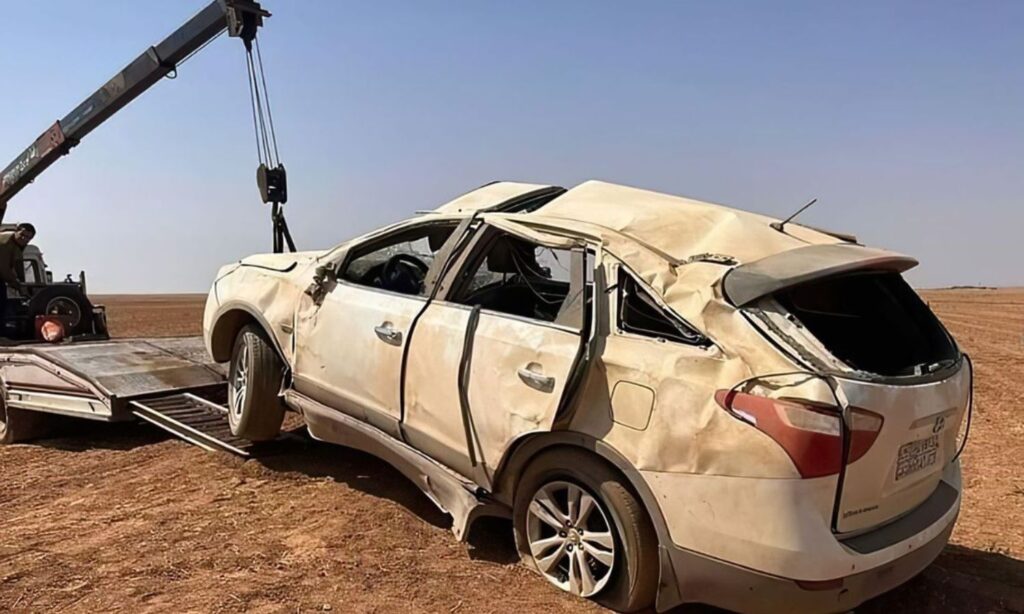Qamishli – Majd al-Salem
Without feasible solutions to reduce it, traffic accidents recur in the northeastern city of Qamishli in Syria almost daily, which often causes tragic deaths.
Coinciding with the start of the school year and hundreds of students taking to the streets every day, most of the residents of the area controlled by the Autonomous Administration of North and East Syria (AANES) live in a state of “worry” due to the high frequency of accidents.
Majdal al-Husseinu, 49, of Qamishli, told Enab Baladi that the streets of the area have become “death roads” as they are very crowded with cars of different types and sizes.
Al-Husseinu added that he feared for his children while they were outside the house after “repeated accidents of cars hitting children in the neighborhood in which he lives.”
He pointed out that pedestrians’ adherence to traffic rules and walking on the sidewalk “does not mean that they are safe from accidents.” Many pedestrians were subjected to “sudden” run-overs by drivers who lost control of their cars, and most of the accidents are caused by drivers under the age of 18.
Driving licenses awarded in exchange for bribes
Fawaz, 50, a taxi owner from Qamishli, blamed the AANES for the large number of accidents as a result of the chaos and ease in granting driving licenses.
Fawaz (who asked not to be named for security reasons) explained to Enab Baladi that a driver’s license in the AANES areas can be granted to a person who pays bribes “while sitting at home,” without taking driving lessons or an examination to ensure his readiness for that.
In this case, an agreement is made with the driving schools, which in turn coordinate this with the examination committee of the Autonomous Administration, according to the taxi driver.
Enab Baladi counted the occurrence of four traffic accidents in just one week in the city of Qamishli, which resulted in the death of five people and the injury of seven others, in addition to significant property losses. Losses are associated with the absence of official statistics on the number of traffic accidents and the resulting human and material losses in al-Hasakah governorate.
AANES: Problem lies in roads
An employee of the AANES’ traffic police denied that it was easy for the Administration to grant driver’s licenses to its applicants, considering that it applies more scrutiny on private and public driving schools, stressing at the same time that some traffic accidents are caused by driving cars by young men under 18 who are not fully qualified to drive.
The police officer (who spoke on condition of anonymity for security reasons) added to Enab Baladi that the high frequency of traffic accidents in al-Hasakah is due to the deterioration of the technical condition of roads and road partitions, the spread of potholes, and the increase in the number of imported European cars in a way that is not commensurate with the road readiness, which causes a state of severe traffic on the roads.
The entry of hundreds of tanks daily to transport oil and fuel, each with a minimum load of about 20 tons, caused damage and cracking to the highways, especially during the summer, the source says.
Temperatures reduce the hardness of the asphalt material, cause bends and grooves within the roads as hundreds of trucks and tankers pass through, and thus more car crashes occur.
According to the source, the Autonomous Administration is working to reduce the causes of traffic accidents in cooperation with the municipalities and the traffic police to implement many projects, such as increasing patrols at junctions and roads, distributing traffic signs that restrict speed, not being lenient in the issue of violations, and increasing and improving the technical situation for industrial speed bumps and road partitions, and the installation of traffic lights at major intersections,
The Autonomous Administration is working to change lanes on some important and vital streets in the city of Qamishli to reduce congestion during peak hours, such as the main street road to al-Hilaliyah, which has become for go-only, while the return road has been transferred to Hamo pharmacy street, starting from the “Sabaa Bahrat” (Seven Squares) roundabout.
The AANES’ Local Administrations and Environment Authority had previously announced several projects, including the construction of new roads and the maintenance and repair of old roads, according to its work plan for the current year, in the cities of al-Hasakah, Qamishli, Amuda, and even the city of al-Malikiyah. But according to what Enab Baladi monitored, the impact has been limited so far as a result of the weak technical capabilities and practical experience of the AANES cadres.

